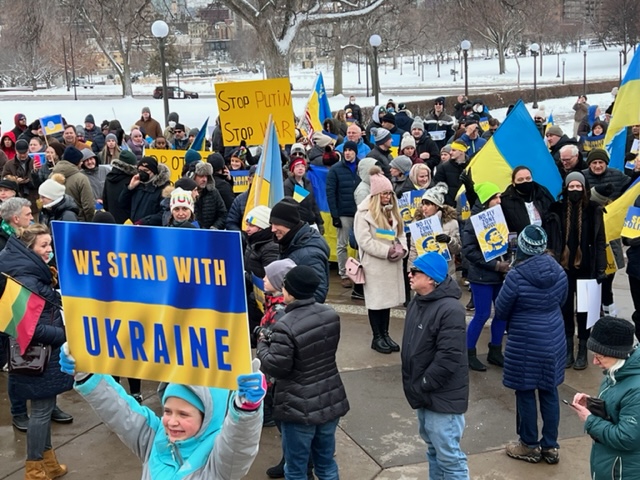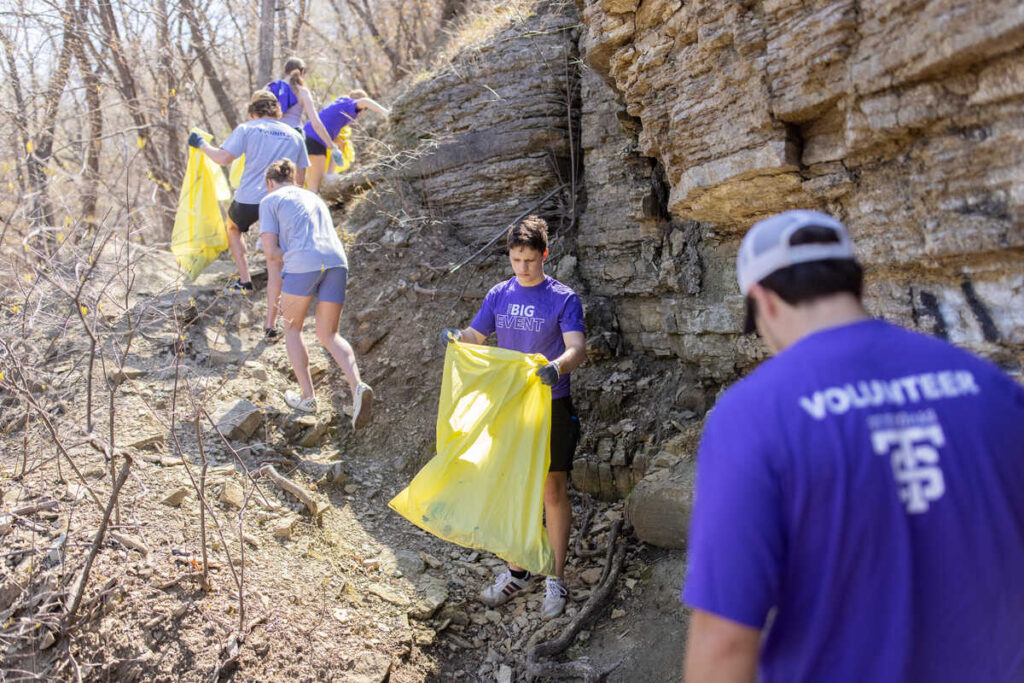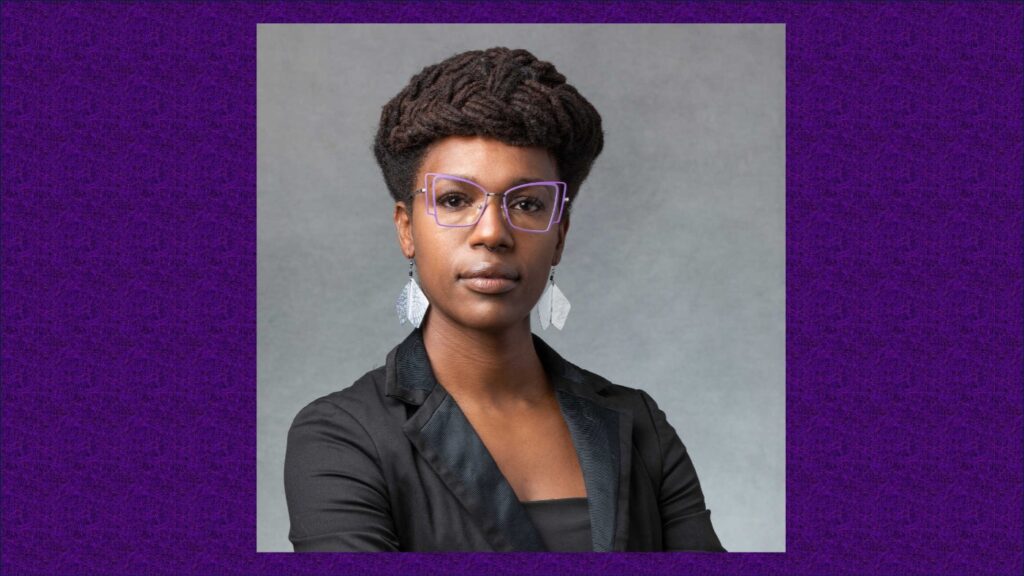College and high school students across America are currently cramming for midterms or preparing for spring break. It’s life as usual for most of them, but for St. Thomas international students Oksana and Bohdan their daily thoughts are with their family and friends they left behind in Ukraine when they came to study in the U.S. And, as Bohdan says, he feels helpless right now.
“It is very hard to understand and to see that there are bombs and bombings in schools, and kindergartens are being shelled,” he said.
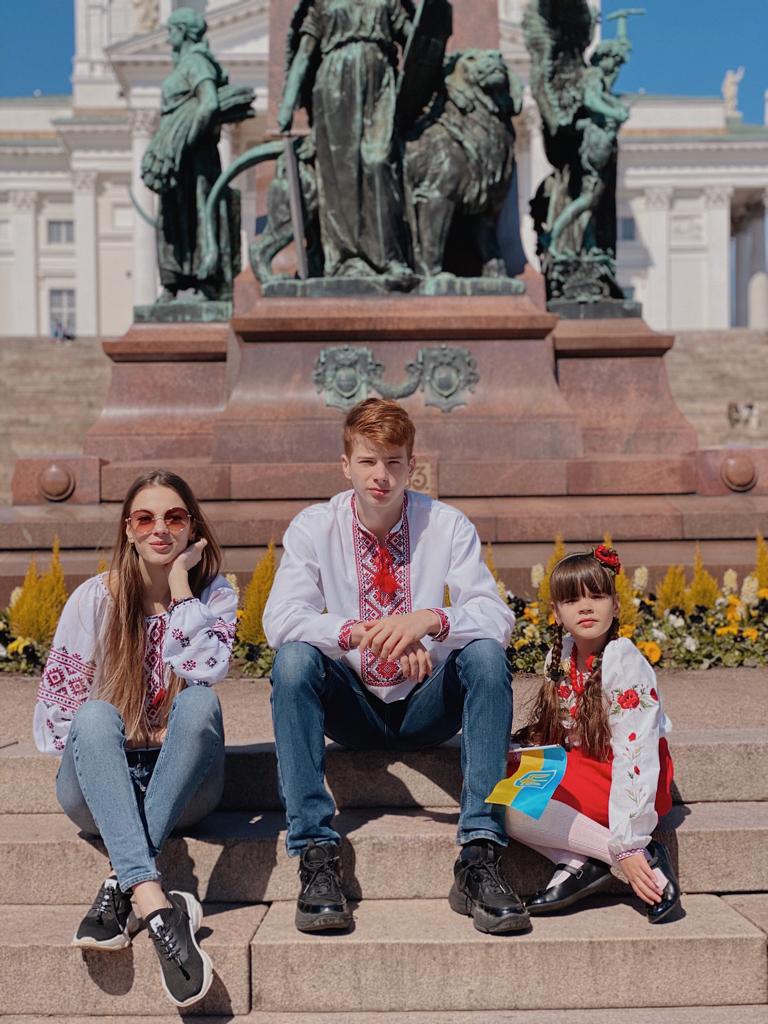
This is very personal for him. He has a sister in elementary school living in Ukraine with his parents. His dad is in the Ukrainian army. “I can’t tell much of his day to day. When I can reach him, he tells me about their victories on the battlefront.”
Part of those victories for Ukrainian forces include locating small red markers placed by Russian soldiers on roads and in areas targeted for bombings. Rockets are programmed to locate these markers and hit the spot.
“Every soldier in every city is concerned about finding those marks,” Bohdan said. “That’s the day to day for Ukrainians; looking for ballistic rocket marks and breaking them.”
But rockets still fall. As news reports show, buildings and villages are being destroyed by Russian airstrikes. Elementary schools are being reduced to rubble. Children are being killed and injured. After one shelling at a secondary school in Chernihiv in northern Ukraine, one injured student took to Instagram, describing the explosion, revealing her injuries and stating “I hope things are better where you are.”
Oksana, who has lived her whole life in Ukraine before entering law school at St. Thomas, said, “My heart hurts because many innocent people are dying, kids are being killed and the country is savagely being destroyed. If someone would have told me I would cry at St. Thomas School of Law because of the war in Ukraine, I would definitely have thought that person was insane. War cannot be imagined even in a nightmare. But the war, which I and millions of Ukrainians could not imagine, has become a reality today. ... tragic, terrible, harsh reality.”
It is also a harsh reality for St. Thomas Theology Professor Paul Gavrilyuk, who is from Kyiv, Ukraine’s capital city. He is the only one from his extended family living in the U.S. He has several family members still in Ukraine. Some are stranded in their towns.
“I have an aunt stuck on an island close to Kyiv,” he said. “The Russians blew up a bridge connecting that little area with the mainland. That bridge will not be rebuilt anytime soon.”
Some of his relatives, such as his elderly parents, were able to flee with the help of friends.
Gavrilyuk recounted last week to KSTP News the story of his parents' migration and he told a part of it again on Sunday, March 6, at a rally on the steps of the Minnesota Capitol in St. Paul, where Gov. Tim Walz and Minneapolis Mayor Jacob Frey were among the invited speakers.
He told the crowd of hundreds who gathered that his parents, now in their 70s, are refugees for the first time in their lives. They left home, headed to the Baltic region.
Gavrilyuk told the St. Thomas Newsroom in an interview on March 2 that originally his parents wanted to remain in their Kyiv home, but Gavrilyuk and other relatives convinced them to leave. First they were moved to a cabin in a rural area on the outskirts of Kyiv where his parents hoped the Russian invasion would not reach.
“My parents naively thought ‘there is nothing here but cows and sheep; nothing here to bomb.’ But that proved to be wrong,” Gavrilyuk said. Drones were spotted flying overhead.
“We convinced them to go to the center of the country, westward. A road trip that would normally take 10 hours give or take, is taking them six days.”
The extended time is because of the caravan of vehicles headed to the western border. News reports indicate that about 2 million Ukrainians are now refugees, having fled to other countries with thousands upon thousands more attempting to leave every day.
As his parents embarked on that journey, within 150 miles “they managed to get two flat tires,” he said. Somehow a friend came to their rescue and replaced the tires. “They had to spend the night stalled under a tree and within a day they were within the western town of Ternopyl.”
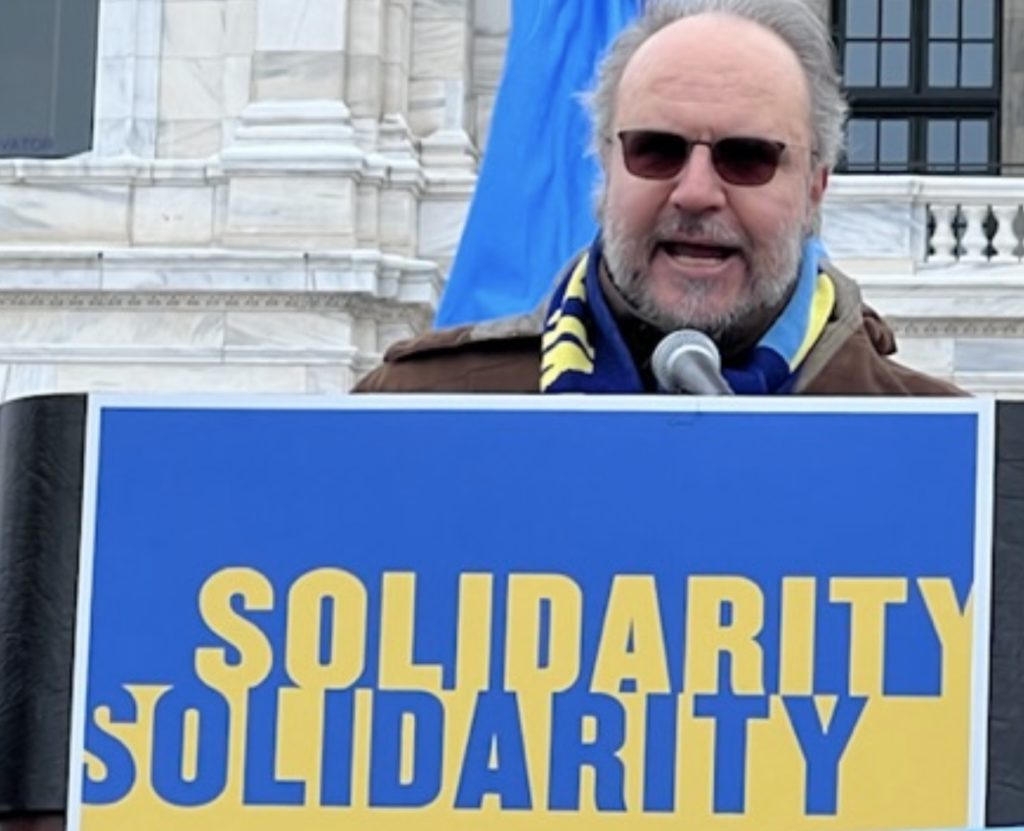
Ternopyl is another city where people believed is so far west that the Russian government would have no interest in or less ability to attack or occupy, said Gavrilyuk. Again, that proved not to be the case. “While they [his parents] were in that town, it was bombed three times, with bombs flying largely from the south.”
Poland was the closest international border for his parents to cross. The Polish government is letting in refugees even if they do not have all proper paperwork for international travel. These relaxed rules also caused a bottleneck of travelers who flocked to these security checkpoints.
“The wait at the Polish border security point was three full days and with the weather we have right now [in Ukraine] it is not good for my parents,” Gavrilyuk said. “The decision made for my parents was not to cross at the Polish border, so they proceeded south to the border at Moldova. They were greeted by very polite volunteers and were escorted with police to the border of Romania.”
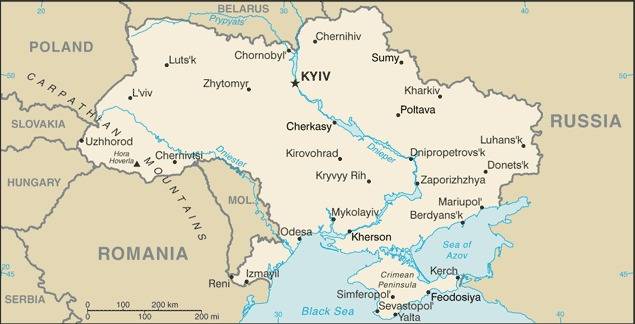
Romania is west of the Republic of Moldova and is a member of the European Union. His parents will ultimately seek refuge in the Baltics. The Baltic states is a term used to describe three countries: Estonia, Latvia and Lithuania, which border the Baltic Sea. All three countries are members of NATO and the European Union.
“The only thing the Ukrainian people ever wanted is to be a part of the European Union,” said Bohdan. “As a community, every single community and every single person should understand the motivation of the Ukrainian people. What the Ukrainian people want is basic freedom.”
St. Thomas Political Science Professor Renee Buhr has been interviewed by several media outlets about Russia’s war against Ukraine. She told the St. Thomas Newsroom that she, herself, has no family ties to the region, but her research area is on international relations and foreign policy, with an emphasis on comparative politics between Europe and the former Soviet Union. Both Russia and Ukraine were a part of the Soviet Union before its 1991 breakup.
Buhr wants people, including her students, to understand the conflict. “This is not a new situation; it has been slowly building toward this. The story really starts in 2004,” she said. That, coincidentally, is the year Putin won reelection to his second term as president. But more importantly, Buhr said, presidential elections in Ukraine in 2004 pitted a pro-European candidate (Victor Yushchenko) against a pro-Russia candidate (Victor Yanukovych).
"Yushchenko’s eventual victory, which followed a mass uprising in favor of fair elections known as the Orange Revolution, changed the course of Ukraine toward a more democratic and European direction. Prior to that time,” she added, “the Ukrainian government was populated by pro-Russian, former Soviet policymakers.”
Fast forward 10 years. In 2014, Russia made several military incursions into Ukrainian territory. “Putin has been trying to pull Belarus and Ukraine back in,” Buhr said. “He has this view of the Russian people that is a broad interpretation that comes from rationales that the Czarist regime used to justify subjugating Belarus and Ukraine … that Russia, of course, is the big brother and should have control of all of it. So ever since Putin came into office in 1999 [his first term as president] he's been trying to pull Ukraine and Belarus back in. He's been more or less successful with Belarus. Ukraine is the outlier; the one that keeps getting away from him.”
The current president of Ukraine, Volodymyr Zelensky, supports a democratic government and has filled out an application for Ukraine to join the European Union, as he posted on Facebook on Feb. 28, appealing for immediate entry.
Ukraine is not currently recognized as an official candidate for EU membership, though it's been part of an association agreement with the EU in which both parties agreed to align economically when, under then-Ukranian President Petro Poroshenko, they signed the Ukraine–European Union Association Agreement June 27, 2017.
“When the world is normal,” said Buhr, “you have good things fighting against other good things” and “in international relations, which is my main field of study, we very seldom would say this is clearly right, and this is clearly wrong, but the world is not normal. So, in the case of Russia's recent attack on Ukraine, it is one of the few things where I can say there was a right side and wrong side. The attack by Russia on Ukraine, first and foremost, violates a norm in the international system that we refer to as territorial integrity. Anyone who violates territorial integrity, the way that Putin is doing, and actually threatens to take an entire country over, is the bad guy.”
Buhr explained that territorial integrity, largely accepted by the international community, allows people to live fairly stable lives knowing that there is an acceptance of borders between countries.
“These rules are so fundamental and [Putin] so clearly violated them. Once you start changing those, especially by force, and not by consent, then you've thrown everyone into a situation where anybody who is powerful and wants to take something feels like they can take it. So that is wrong, period,” she said.
Buhr, who worked at the Central Intelligence Agency among other organizations before entering academia, will participate March 16 on a panel discussion called “Understanding the Conflict in Ukraine.” She will be joined by Zsolt Nagy, an associate professor of history at St. Thomas whose area of research is on modern Europe with a specific focus on East and East-Central Europe. The event is open only to the St. Thomas community and also includes Colleen Ryan '14, who graduated from St. Thomas with a bachelor’s degree in political science and recently completed her master's degree in human rights at the Humphrey School of Public Affairs with a focus on women and security sector reform in the Balkans.
Buhr’s advice for the St. Thomas community and others is to stay as informed as possible. “For all of our mental health, I wouldn't recommend constant scrolling [on the internet], but make sure you're reading really credible sources, make sure that you're getting information from places like the BBC or France 24 or Deutsche Welle or reputable news agencies in the United States.”
She said there is a lot of misinformation on the internet, some of which she says is a concerted effort by the Kremlin to change the narrative. “They are trying very, very hard to confuse Americans about the facts and all it takes is a little bit of [misinformation] that starts to poison you. It's really hard to tell fact from fiction.”
One thing to remember is that the war is a product of the Russian government; it is not all of the Russian people, said Gavrilyuk, who received his bachelor's degree from a university in Moscow and still has friends there.
Oksana agrees. “Many Ukrainian families have relatives in Russia and vice versa,” she said. “In school we have been taught that Ukrainian, Russian and Belarusians are brothers, fraternal nations.”
She added: “I strongly believe that each country has a right to have its own independence, territory and language. Each nation has a right to self-determination, and each person has a right to live instead of being killed by indiscriminate bombing in the 21st century.”
“The Russian war against Ukraine has created a staggering number of humanitarian problems,” said Gavrilyuk, who is currently raising funds to provide food, medical supplies and protective gear for the Ukrainian voluntary defense units. He said that anyone wishing to support this effort may contact him at plgavrilyuk@stthomas.edu.
